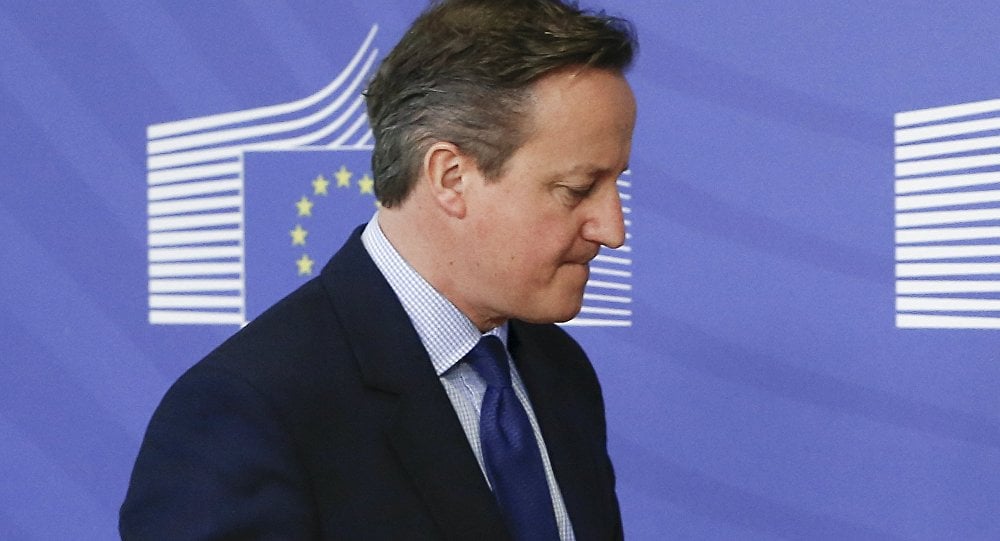
The Kremlin wants Britain to leave the EU. That, at least, is the impression given by the coverage of the so-called “Brexit” debate by the RT television channel and the Sputnik news wire, both of which are funded by the Russian government. In the week that followed the announcement of European Council President Donald Tusk’s proposed deal to keep Britain in the EU, both channels’ reporting betrayed a systematic bias in favour of the “Out” campaign which was too consistent to be the result of accident or error. Since neither outlet operates on a commercial footing, it appears reasonable to conclude that their bias is the result of a political choice, Ben Nimmo wrote for The Institute for Statecraft.
The headlines
From 1 to 8 February 2016, Sputnik ran 16 stories featuring the word “Brexit” somewhere in the text.1 Fourteen of them dealt with Brexit as an issue; two merely referred to the concept in passing.
An immediate bias emerges from the nature of the headlines of those fourteen stories which dealt directly with Brexit. In all, eight were negative in tone, quoting critics of Tusk’s proposals, emphasising the alleged difficulties in sealing a deal, or making the assumption that a majority of British voters favour the “Out” camp:
Cameron’s Climbdown: Brexit Campaigners Slam ‘Blatantly Staged’ Talks
Cameron’s Long-Awaited Brexit Deal Plans Branded Trivial by Critics
Independence, Ideology, Economy: Why Britons Are Pushing for a Brexit
Tusk’s EU Reform Proposals ‘Hardly Worth Waiting for’ – UKIP Leader
Not a Done Deal Yet: Member States Pose Threat to UK’s EU Reforms
Cameron Not Out of the Fire as EU Gives Response to Brexit Talks
UK Conservative MPs Condemn Cameron for Dismissing Eurosceptic Views
Unsigned Check: Critics Say Britain’s EU Deal Won’t Deter Immigration
Five were broadly factual in tone:
Registration for Brexit Referendum Campaigners Opens in UK
EU’s Tusk Proposes National Parliaments Could Discontinue EU Legal Plans
Brexit Referendum May Take Place in ‘Few Months’ – Cameron
Brexit Referendum Campaign Not to Coincide With Regional Elections
Cameron to Warn Brexit May Lead to Emergence of Refugee Camps in England
One headline gave a negative tinge to what could have been a positive report. The story itself concerned a statement by Bank of England Deputy Governor Ben Broadbent that the Bank had “not yet seen” any weakening of investment intentions in the UK. Despite the fact that there was no mention of the word “panic” anywhere in the story, Sputnik’s headline ran:
Bank of England on Brexit: No need to panic, yet
Not one report, out of fourteen stories published in an eight-day period, headlined comments which were favourable to the Tusk proposals. In other words, Sputnik’s choice of headlines was clearly unbalanced in favour of the “Out” campaign.
The commentators
This appearance of systematic bias is reinforced by the number of supporters of each side quoted in the reports. Beyond the protagonists in the debate – principally Tusk and UK Prime Minister David Cameron and their spokespeople – Sputnik referred to a number of external commentators in its reporting. The following commentators were quoted as criticising the Tusk proposals:
Liz Bilney, CEO of the “Out” campaign group Leave.EU;
MP John Redwood, an “Out” campaigner;
MP David Davis, an “Out” campaigner;
Matthew Elliott, CEO of “Vote Leave”;
Paul Stephenson, spokesman for “Vote Leave”;
An unnamed spokesman for “Vote Leave”;
MEP Jane Collins, member of the anti-EU political party UKIP;
Professor Patrick Minford, a Eurosceptic academic;
MEP Nigel Farage, leader of UKIP;
A letter from Eurosceptic MPs and Conservative Party members accusing Cameron of ignoring them.
By contrast, the following commentators were quoted as giving positive comments on the Tusk proposals:
UK Foreign Secretary Philip Hammond;
Dutch Foreign Minister Bert Koenders;
German MEP Manfred Weber;
JPMorgan Chase bank;
Goldman Sachs bank.
No member of any “In” campaign group was quoted. Moreover, the commentators who backed Tusk’s proposals were given far less prominence than those who opposed them: for example, Farage’s comments were given the headline and three full paragraphs of a report; Hammond’s comment was relegated to the very last sentence of the same story.
Even a story whose headline quoted Cameron’s words factually – “Cameron to warn Brexit may lead to emergence of refugee camps in England” – was given a negative slant, as it provided only one commentator to analyse Cameron’s claim: a spokesman for “Out” campaign group Vote Leave who said that Cameron was “scaremongering”.
Thus, across the week’s reporting, Sputnik reported comments from significantly more “Out” partisans than “In” ones – a two-t0-one margin. It gave them more coverage in stories where both sides were represented, and in a number of stories, it reported their comments without any quotes from “In” campaigners at all. This, again, is a systematic failure to provide balanced reporting.
The context
The lack of balance becomes still more apparent when the context of these comments is taken into account. As we have seen, Farage, Minford and the Eurosceptics who penned the letter accusing Cameron of ignoring them each had a story dedicated to their comments. The story on Farage appended half a sentence from Hammond; the interview with Minford had no direct quotes from any other sources, only the indirect comment that “While pro-EU campaigners have argued that leaving the bloc would be an economic disaster, professor Minford disagrees”; the report on the letter had no countervailing quotes of any kind.
It is worth comparing this direct reporting of their criticisms, without providing balancing quotes or context, with the coverage provided to the commentators who favoured the “In” campaign.
For example, the warnings by the two US banks over the financial risks of a Brexit were followed by the editorial comment, “such scare mongering by US banks has been dismissed by the Bank of England”. The comments from Koenders and Weber came under the headline, “Cameron not out of the fire as EU gives response to Brexit talks”, and were followed by the editorial statement that “The mixed response to the Tusk-Cameron proposals show he has a long way to go to convince his critics.”
In other words, even when “In” campaigners were quoted, their comments were followed by editorial statements belittling or dismissing them.
Use of language
Indeed, the editorial tone of Sputnik’s Brexit coverage also betrays an “Out” bias. Examples of slanted language used by the outlet in what appear to be straight news reports, rather than opinion pieces, include the following:
“The emergency break [sic] deal is a serious step-down for Cameron…”
“Cameron is desperate to get an agreement…”
Cameron “still has an uphill battle…”
Taken together, these cases show a pro-“Out” bias which is systematic and consistent. Pro-“Out” campaigners are quoted more frequently and at greater length than pro-“In” ones; pro-“Out” comments are given greater prominence in headlines and stories; pro-“In” comments are reported in stories whose overall context favours the “Out” camp; the editorial choice of language supports the “Out” campaign.
These are not isolated incidents: they concern an entire week’s worth of Sputnik reporting on the Brexit issue. Taken together, they show that Sputnik’s Brexit coverage is not balanced, but demonstrably slanted in favour of the “Out” campaign.
RT
RT’s coverage of the Brexit debate has been somewhat less enthusiastic than that of Sputnik. From 1-8 February 2016, the broadcaster featured ten stories on its website that referred to the issue.2 Three of the search results had no headlines, as they referred to regular scheduled shows; the other seven were headlined. Two of the headlines were distinctly slanted against Cameron and the EU:
EU referendum: Cameron hints at June 23 vote amid Tory and union splintering
Anti-democratic, unaccountable EU unfazed by Cameron’s reforms – Yanis Varoufakis
One was mildly negative, albeit satirical:
Dinner date but no deal: Cameron & Tusk extend talks on avoiding Brexit
One was factual in tone but reported a poll favourable to the “Out” camp:
Brexit support hits record high – poll
One was factual in tone, but reported a comment favourable to the “In” camp:
‘Brexit’ will cause migrant ‘Jungle’ camps to grow in Britain – ex-UKBA chief
The remaining two were factual:
EU negotiations – Tusk offers Cameron migrants benefit compromise
#WhoWillSpeakForEngland: Twitter offers witty reply to Daily Mail
Overall, there is a slight imbalance in favour of the anti-EU camp, albeit less marked than in the case of Sputnik.
The reporting itself also showed a degree of imbalance. For example, RT’s report on the outcome of two contradictory opinion polls on the issue of Brexit was headlined, “Brexit support hits record high – poll”, and began with three paragraphs on a YouGov poll showing increased support for a Brexit, before acknowledging in a single paragraph that “the results contradict another poll, released Saturday, which showed the majority of Britons are in favor of staying in the bloc, despite a rise in support for the Brexit campaign.”
The report on the Tusk-Cameron dinner, meanwhile, led with a fact – the talks and their outcome – but added the editorial aside that they were “sugar-coated with a three-course dinner”, and went on, “It was hoped the talks over dinner would help narrow the gap over Britain’s disputed demand for more control over immigration. Alas, Tusk emerged from Cameron’s 10 Downing Street office saying there was “no deal.” The use of language is closer to that of a partisan than a disinterested observer.
Strikingly, RT reported comments made by Yanis Varoufakis, the former Greek finance minister, calling for Britain to stay in the EU and help to reform it. (The original commentary was published in the Guardian). However, the RT version of the story relegated Varoufakis’ warning against Brexit to one sentence in the third paragraph and three sentences in the tenth and eleventh paragraphs. The headline and lead paragraphs focused on what RT termed Brussels’ “blatant disregard for democracy” (the word “blatant” does not feature in Varoufakis’ text) and Cameron’s “hollow attempt” at negotiations (Varoufakis’ original phrase was “hollow compromise”, a significantly different choice of words). In other words, where Varoufakis’ article focused on the argument for Britain to stay in, RT’s intepretation focused on criticism of the EU and of Cameron.
As in the case of Sputnik, RT’s reporting on reactions to the Tusk proposals also quoted a preponderance of “Out” supporters:
MP Liam Fox, an “Out” campaigner (quoted in multiple stories);
The unnamed founder of Leave.EU;
London Mayor Boris Johnson, quoted criticising the Tusk deal;
MEP Nigel Farage;
UKIP member Paul Nuttall.
By contrast, it quoted two “In” supporters: Home Secretary Teresa May, as “a Eurosceptic who seemed to have been convinced”, and Europe Minister David Lidington, who “attempted to pacify those who believed the draft is not strong enough”. May’s comment in parliament was covered in a sentence, then followed by three paragraphs of comments from Johnson and Fox. Lidington received a single sentence; in the same report, Farage and Nuttall together received five paragraphs and an embedded tweet.
One report did quote a number of former European politicians arguing that a Brexit would harm the UK economy. This reporting was broadly balanced in tone, as it included both a warning against Brexit, and the comment that Britain’s attempt at “cherry-picking” was unacceptable.
However, overall the evidence displays at least some degree of imbalance in favour of the “Out” campaign.
A more evident bias can be observed in two scheduled shows broadcast in the immediate aftermath of the Tusk-Cameron talks. On 3 February, RT’s “Going Underground” talk show conducted an interview with Councillor Robert Oulds, leader of the Eurosceptic Bruges Group and an outspoken advocate of Brexit. The interview ran for five minutes and was pitched as a question-and-answer session with host Afshan Rattansi. “Going Underground” has not conducted any recent interviews with “In” advocates; it did interview UKIP MP Douglas Carswell on his “Out” campaign at the end of 2015.
The fact that the programme has twice interviewed “Out” activists in recent months, and has not broadcast interviews with “In” activists, is in itself a lack of balance; however, the imbalance goes beyond the fact of the interviews, and also emanates from Rattansi’s style of questioning. Rather than posing neutral questions or challenging his interviewee, in order to generate a debate on the merits of the issue, Rattansi posed questions which served to support Oulds’ comments, reinforcing the “Out” argument of a weak prime minister, banks buying influence and unfair BBC coverage. Some of the questions follow, marked with the time at which they appear in the online video:3
04:00 “He [Cameron] is, of course, a PR man, but on the other hand, do you think the point is that he hasn’t been doing the PR that well this time? Because even on mainstream media, people have been commenting and saying, you know, this whole deal is a bit of a fraud.”
06:50 “In fairness to the Prime Minister, he also said something about 5% blocking system? You’ll have to explain it to me, because no-one seems to be covering it much, but it seems to be like a sop to people like the Bruges Group and people on his back benches.”
07:33 “Goldman Sachs has donated hundreds of thousands of pounds to the campaign for staying in. Are you going to beat Goldman Sachs?”
08:33 “Why do you think the BBC is so pro-remaining in the European Union?”
“He hasn’t been doing the PR that well.” “A sop to people like the Bruges Group.” “Are you going to beat Goldman Sachs?” These interview questions cannot be viewed as impartial: they serve rather to reinforce Oulds’ position than challenge it.
A similar bias appeared in RT America’s show “Boom-Bust”, where hostess Ameera David interviewed RT journalist Manuel Rapalo on the Brexit debate. To a large degree, their discussion fell within the bounds of balanced journalism, beginning with a discussion of the Tusk-Cameron talks and ending with an assessment of the impact of the uncertainty on investors. However, these two passages sandwiched an exchange on Cameron’s relationship with his own party which appears distinctly unbalanced:4
“AD: Well, this issue is certainly creating a rift. It’s been very difficult for Prime Minister David Cameron to sort of keep the reins on his own party, I mean what can you tell me about that?
“MR: Well no, that’s absolutely right. There’s quite a bit of doubt, quite a bit of scepticism, even within members of his own party, like you mentioned. Things work very differently in the British Parliament than they do here in Congress, and what we’re hearing, the kind of language from Conservative MPs, members of the Prime Minister’s own party is really fascinating, at least to me. I’ve heard Conservatives call the proposals by the Prime Minister “pint-sized”, somebody said that they were the equivalent of, quote, “polishing poo”, I like hearing this kind of stuff, it’s different. But let me read you a quote from Liam Fox, who’s a conservative MP who says that the reforms have been watered down. This is what he said, he said, quote, ‘None of these changes come close to the fundamental changes promised to the public…. We are being asked to risk staying in the EU based on the back of empty promises from the EU that are not even backed up in Treaty.’ And we’re seeing similar sentiment across the board here, meaning that as challenging as it’s going to be for Prime Minister Cameron to get all the EU leaders to agree on, this is going to be just as challenging getting members of his own party on board with this.”
We are seeing similar sentiment across the board here. The sentence is factually inaccurate – note the comments by Lidington, Hammond and May, cited above – and it is reinforced by the unbalanced choice of quotes. Rapalo quoted three Conservative MPs. All three were attacking the deal. One comment, made by Fox, was posted on the screen for several seconds as Rapalo read it out loud. No other quote was given such prominence; no pro-“In” commentator was quoted at all.
Thus RT’s imbalance may be less obvious than that of Sputnik, but the evidence suggests that it is there nonetheless.
Is it disinformation?
The question then arises whether this bias is accidental or deliberate. First of all, it should be pointed out that RT claims to be providing “an alternative perspective on major global events”, while Sputnik says that it “tells the untold”.
The quest for a different angle and a different story is, in itself, a legitimate expression of journalism. However, it cannot be applied in the case of the Brexit debate. The issue has been widely covered by all the mainstream media, so RT and Sputnik are not reporting an unreported story.
Nor can it be argued that, by focusing their coverage on the “Out” campaign, they are providing substantially new, alternative footage which other outlets ignored. For example, the comment from Matthew Elliott of Vote Leave, cited by Sputnik on 2 February, was also quoted by Reuters; the difference in their coverage was that Sputnik cited Elliott’s comment at greater length, while Reuters balanced it with a statement from Stuart Rose, chair of the “In” group “Stronger In”. Indeed, far from distancing itself from the “mainstream” media in its reporting, RT quoted Reuters in its report on the Tusk-Cameron dinner, Varoufakis in the Guardian on the EU, and Sky News in its coverage of the Conservative Party debate, while Sputnik quoted the BBC on the issue of migrant camps (although in the lead paragraph of the story, it referred to the outlet as “local media”.)
Thus neither outlet is “telling the untold” or providing coverage which the mainstream does not: it is covering the same story as the mainstream media, but granting disproportionate coverage to one side of the debate.
The next question is whether this could be the result of an accident, a single journalist’s error or an inability to find commentators willing to give the “In” campaign’s point of view. The repetitive nature of the bias over the course of a full week’s reporting cycle makes it implausible that it is the result of an accident; likewise, the erratic nature of the spelling (“emergency brake” is spelt correctly in some stories, incorrectly in others) suggests that it is the work of more than one writer. The fact that the imbalance persisted over both outlets, and across RT’s UK and US branches, further suggests that the problem is systemic, not one-off.
The remaining thesis, therefore, is that RT and Sputnik were unable to find anyone willing to give the “In” point of view. This is not a tenable argument. Firstly, the “In” campaign has lobbying groups advocating on its behalf, just as the “Out” campaign does, and other media have proven quite capable of citing them; for example, Stuart Rose’s comment was not only quoted by Reuters, but by France 24 and the Shanghai Daily, while an accusation of “Out” hypocrisy by MP Sir William Soames posted on the Stronger In website was quoted by the Daily Telegraph and Huffington Post. Secondly, London and the nearby towns of Oxford and Cambridge provide what is arguably one of the densest populations of think tanks, journalists and academics in the world, giving journalists a wide choice of possible commentators. Thirdly, the Brexit issue has been debated in both the British and European parliaments, providing a source of public comments both for and against Brexit, such as the Liam Fox comment cited so prominently by RT’s “Boom-Bust”. Therefore, even if the two outlets were to argue that the entire “In” campaign had vowed not to talk to them – in itself unlikely – they could have tried to balance their reporting by taking more pro-“In” quotes from the UK and EU public debates and statements on the Stronger In website. To claim that it was impossible to find a single “In” advocate, whether academic, journalist or campaigner, to balance the comments of interviewees such as Farage and Minford is simply not credible.
Therefore, the unbalanced coverage provided by RT and Sputnik cannot be justified by the claim that they were reporting an unreported story. It cannot be excused by the claim that it was a one-off error. It cannot be explained by an inability to find “In” commentators. The most probable conclusion that remains is, therefore, that the lack of balance was a result of deliberate editorial decision. In essence, the Russian state-funded English-language media appear to have chosen to slant their coverage in favour of the “Out” campaign.
By Ben Nimmo, The Institute for Statecraft





